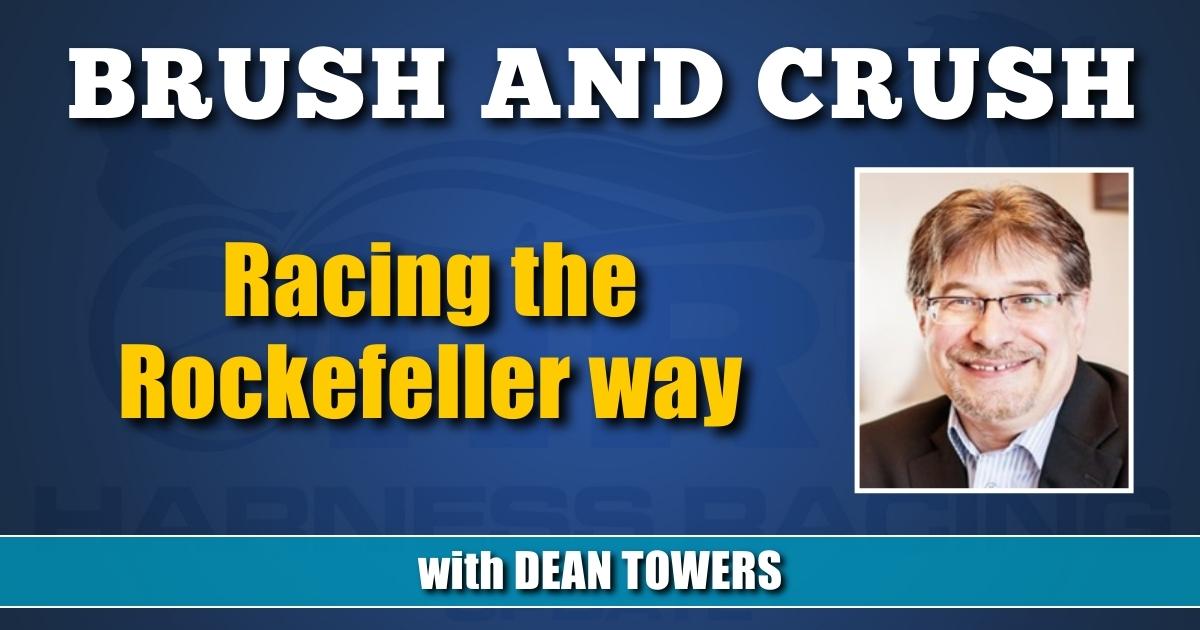Racing the Rockefeller way
Racing needs to learn how to exploit its edge in the new gambling world.
by Dean Towers
I like reading books about people I know little about, and after some searching, I downloaded Titan by Pulitzer Prize winner Ron Chernow. The life and times of John D. Rockefeller was a dandy read.
Although I enjoyed learning about the man and his vast philanthropic zeal – along with the neat fact he owned, bred and drove trotters — I was most enamoured with his business tactics and philosophy.
As most know, his company – Standard Oil — was a Trust, and was the focus of Anti-Trust legislation of the early 1900’s. A “Trust” primarily refers to the way a company was set up to discourage competition; read a monopoly. Rockefeller’s business strategy took full advantage of monopolistic tactics, and did many things we would not consider fair in this day and age.
However, glossed over in history was his savvy business philosophy and this presented many teachable moments.
Rockefeller bought competitors and hired the best of them into executive roles. He created above-board backward and forward linkages, and using large retained earnings he built out new technologies for growth.
He kept the price of oil as low as possible, to combat both new competition, technologies that may be created, and bourgeoning Russian oil.
Rockefeller sold lamps for lighting and other useful items at cost so people could afford these devices to purchase his fuel.
These strategies helped create staggering wealth. When the Trust was broken up in 1911, his net worth was $900 million. To put that into perspective, the entire U.S. federal budget that year was $715 million.
Over the last century, I think the racing monopoly presents a worthwhile contrast.
Racing has constantly — as a monopoly on legal gambling through much of its existence — not kept prices low to kill off competition, it raised them; from 5 per cent takeout in 1907, to the 21 per cent or so today.
Racing has not sold ‘lamps’ at cost to fuel long term demand for betting. We’ve all paid for past performances, admission and even a pencil at the track to mark our programs. Hell, it’s not that long ago TVG had “per bet” fees.
Racing did not raid other firms for top talent – say, from online gambling houses or sports betting – and put them in positions of power based on their unique skill-set.
Racing did not retain earnings to use as investment into the future; into new markets, brand new technology, or buying pieces of old ones. Even its slot money primarily went from a nickel dropped into a machine directly into purses or a share price.
At racing conferences and in board rooms, the topic has rarely been about how the competition can be killed, rather how the sport can slow the competition from doing the killing.
That’s the past you may say, and that’s true. But it’s the mindset that I find troubling as the sport tries to move forward.
For example, racing still holds a monopoly on pari-mutuel wagering. This system, notwithstanding its flaws, works very well and is unique in the gambling industry. It contains the tote and a pipeline of deliverables no one else owns – not FanDuel, or DraftKings or William Hill — encompassing millions of worldwide customers with billions on account. What can the sport do with it? Is anyone even talking about it?
Scraping away the anti-competitive, rock bottom business tactics of Rockefeller, he’d probably look at this sport oddly. How can it have such an advantage on other forms of gambling and it not result in massive market share and a healthy balance sheet? It’s something we’ll never know, but I honestly believe there’s still time to reverse the oversights; to reverse the old way of thinking.
I don’t agree as some say that “racing is dead” as a gambling game, but I do think it needs to learn how to live. Racing’s pure wagering monopoly may be over, and that’s too bad, but with the right people calling the shots, I think there’s still a lot of meat on the bone to create and exploit new ones.

















